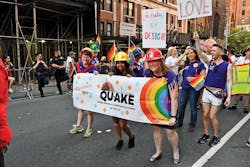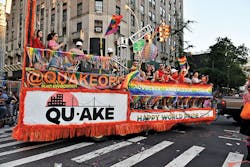On equity, diversity, inclusion, and social justice in transportation
By: Guillermo Diaz-Fanas, P.E.
In the last few years, many industries have seen a positive shift towards promotion of diversity and inclusion through innovative initiatives and outreach activities that tackle achieving “equality” and a more inclusive workplace culture.
The transportation industry is no different, as organizations dedicated to specific disadvantaged groups have emerged, hoping to help those individuals that lag far behind in corporate settings and whose interests are not well represented in the leadership ladder.
According to 2014 reports from the U.S. DOT, eight out of every 10 workers in the transportation industry were men. Broken down further, rail and highway transportation have the highest gaps by far with just 10% and 11% of workers, respectively, being female. Even though air transportation and transit have higher shares of female employees, they still rank considerably lower than the national average, accounted to be 47% nationally in 2014.
Similarly, the significant salary gap between males and females is a clear indication of inequality, as studies suggest that the female-to-male average salary ratio in the transportation industry is close to 84%. This average reflects more than just being male or female, as there are other aspects that also contribute to one’s compensation. In STEM careers, including transportation, a report by the Pew Research Center indicated that Black women earn about 87% of White women’s salary and about 62% of White men’s salary; and that Hispanic women earn about 85% of White women’s salary and about 61% of White men’s salary.
Such disparities worsen based on the complex intersectional identity of certain individuals, as certain identity dimensions (e.g., socioeconomic status, physical/mental ability, religion, etc.) place people in a more disadvantaged category. Such marginalization goes beyond salary disparity as numerous individuals are not given the same opportunities as their socially conforming counterparts, and experience discrimination and harassment in public spaces, particularly when using public transit. For example, the 2011 U.S. National Transgender Discrimination Survey reported that within its 6,450 respondents, 22% were verbally harassed or disrespected on a bus, train, or taxi; 4% were physically assaulted by a police officer on a bus, train, or taxi; 9% were denied equal treatment or services on a bus, train, or taxi; and 26% reported experiencing any of the aforementioned three. A follow-up study from Portland State University documented that binary-identifying trans men reported next to no transit issues, while trans-feminine individuals experienced the most severe attacks and frequent microaggressions.
Minority workers, especially LGBTQIA+ Black, Indian, and People of Color, typically experience extreme hardship while pursuing careers in the transportation sector, as such jobs are predominantly part of a wider cisgender male-dominated culture. They are frequently given fewer opportunities, and when opportunities exist, there are limited mechanisms in place to ensure successful integration in the corporate culture. In response to this, there is an urgent need to go beyond diversity and inclusion. Equity measures that lead towards social justice would help alleviate the massive inequalities faced by individuals working in the transportation sector.
There are several organizations in the U.S. that contribute towards achieving parity for minority workers in the transportation sector, including: the Queer Advocacy and Knowledge Exchange (Qu-AKE), which promotes LGBTQIA+ inclusion and empowerment in the built environment; WTS, dedicated to the professional advancement of women in transportation, while helping women find opportunity and recognition in the transportation industry; the National Society of Black Engineers’s Transportation Special Interest Group, which is focused on increasing the number of Black transportation engineers in the U.S.; and the American Society of Civil Engineers’ Members of Society Advancing an Inclusive Culture initiative, which is tasked with advancing diversity, equity, and inclusion interests of the civil engineering community, including transportation engineers.
These organizations bring awareness and promote equitable opportunities for all people to participate in the transportation profession, reaching thousands of workers across the U.S. Members of various interest groups empowered by these organizations have unique perspectives, experiences, and needs. Therefore, allocating resources to gather such feedback, in collaboration with academic and civil society partners, would be valuable to better understand challenges and opportunities for workers within the transportation sector. The data collected could need to be disaggregated to better capture how different groups are affected within this industry. Such results could guide a larger framework meant to identify and assess equity, diversity, inclusion, and social justice (EDIS), to better plan strategies and develop best practices guides that would strengthen this sector’s capacity to thrive without leaving anyone behind.
Potential strategies could focus on increasing recruitment and retainment of minority workers through relevant policy-level measures, clear performance targets, and monitoring and evaluation instruments. Similarly, the transportation industry would achieve better results by building a culture of employee recognition. Filling the wide disconnect between how managers and staff perceive expectations and opportunities for advancement may be achieved by incorporating a sound performance review process that reduces vulnerabilities to implicit bias, ultimately ensuring that goals are fully aligned with responsibilities, abilities, and opportunities for workers.
The transportation industry could also benefit from encouraging organization-wide pay audits to evaluate differences in pay that may be due to implicit biases. Additionally, the industry could consider a massive restructuring of payment scales to standardize salaries based on position, competency, and location. Such salaries could follow a point scale that reflects the annual performance of the worker and should not be set by the supervising manager, but an independent HR specialist. HR specialists could disclose salary ranges and associated point scale to allow workers to raise questions or concerns related to their compensation as they see fit.
Mentorship plays a crucial role in achieving EDIS in the workplace, as it boosts engagement and retention towards better opportunities. Private and public transportation entities should develop an organic mentorship process that allows workers to navigate their own needs—thus, a multilayered mentorship core group composed to cover different dimensions of the worker’s life, including traditional, reverse, peer, aspirational, practical, coping, and identity mentors.
The transportation sector is indeed advancing EDIS in many regards, but there is still a lot of work to be done. Public and private sector entities are called to collaborate with civil society organizations and academia in identifying and assessing EDIS risks and opportunities; they are also encouraged to incentivize minority recruitment and retainment through transparency, innovation, and formal mentorship programs that empower workers across all levels. In the transportation industry, everyone needs to be part of these efforts serving as vehicles of progress bridging opportunities that promote EDIS.
About The Author: Diaz-Fanas is an infrastructure climate consultant at the Public Private Infrastructure Advisory Facility of the World Bank Group in Washington, D.C. He is also the founding president of Qu-AKE.





